Field Report: Vitalia, The City of Life
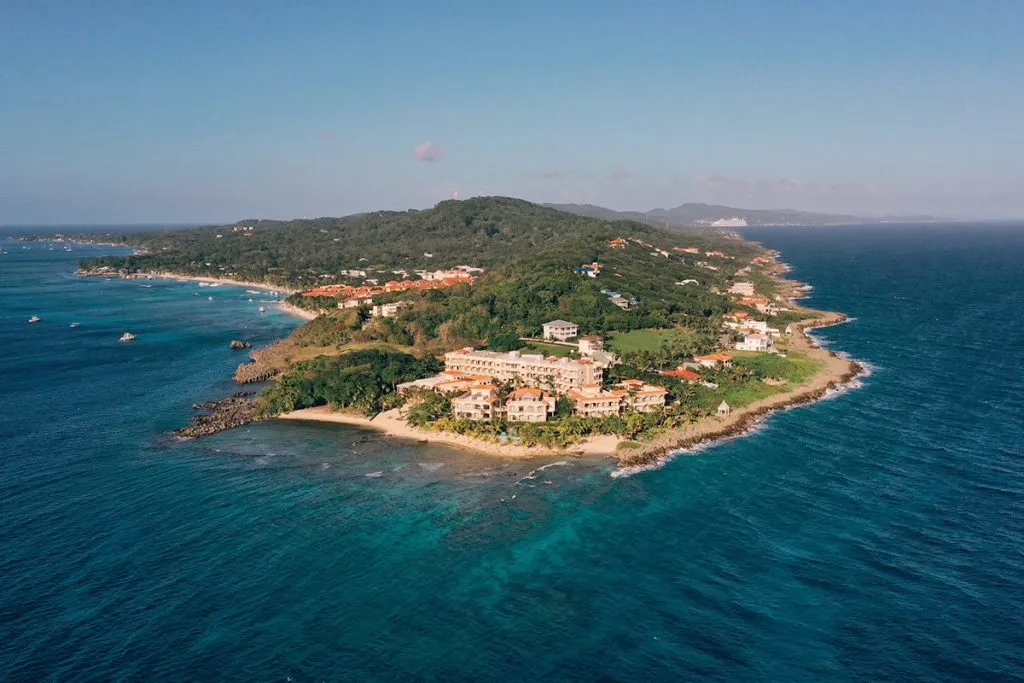

The island of Roatan, the softest parabolic curve in the Gulf of Honduras, is sprouted with dense forest. The reef on its north side is one of the world’s largest. The waves crash into it, leaving the warm Caribbean water to lap gently on the beaches. On some days the sea appears a lake, slower and even more still than island time.

I came here to visit the City of Life.
Roatan is where a number of enthusiasts and experts from around the world have gathered around longevity: the science and art of extending lifespan. For two months, they are dropping in and out of Vitalia, a “pop-up city” hosted on this Honduran island. Think of it like an extended work retreat: work life continues under the island sun, but punctuated by regular talks, dinners, self-organized fitness activities, visits by luminaries, and the occasional formal conference.
Longevity is not a mental health modality. But it is a movement, and to some degree a culture, and while still nascent, I think it will become influential. That’s why I was there—not only to find out how longevity enthusiasts think about mental health, but to find out how it might feel to live in the future: a future in which aging is resisted, degenerative diseases like Alzheimer’s are avoided, and even death is conquered. My trip turned out to be a lesson in longevity, but also in the equally young movement of “startup cities.”
Vitalia, the City of Life, has brought together a large cast of characters. Niklas, the large-bodied German investor and one of the main organizers of Vitalia, strikes a stern figure which is overcome by his kind disposition and long surfish hair. Morgan is a warm and noticeably intelligent woman whose extensive career through research, medicine, and cybersecurity betrays her real age; she looks no older than 25. There are the eccentrics, such as Jose Cordeiro, a noted futurist who frequently shouts IMMORTALITY! to the smiles and cheers of other Vitalians. It’s a slightly more diverse crowd than I imagined, both ideologically and ethnically. Participants are from many countries, including some from Honduras.
Most work adjacent to tech, some with medical backgrounds but also joiners from cryptocurrency and AI research. It felt nice to be in a place where I could just explain my own convoluted career with a line like, “I ran a research organization in crypto.” It’s not a group of people who overvalue credentials—thankfully, for I have none—but it’s a rather accomplished group nonetheless. Many are medical doctors or have advanced degrees in specialized fields of biology or neuroscience. In one town hall, someone asked, “How many of you have started a business?” About 100 hands went up and only a few stayed down.
I arrived on a Thursday, which is when Vitalia holds its weekly “builders update.” It’s a time for residents of the temporary city to give updates on their projects and to pitch ideas to the group. I sat through a few garden variety pitches: crowdfunding a massage table for the wellness room, starting a longevity-focused scientific journal, and so on. Then a very fit, bespectacled Russian man, Petr, stepped to the mic, and in broken English introduced his company’s vision: safe head transplantation. He stammered and gestured his way through a slide deck, explaining his recent advancements in spinal cord separation in rats and how head transplantation needs to be improved if artificial bodies ever become available. His stumbling English sentences somehow added to his charisma. This, I thought―this is the stuff I came to see.
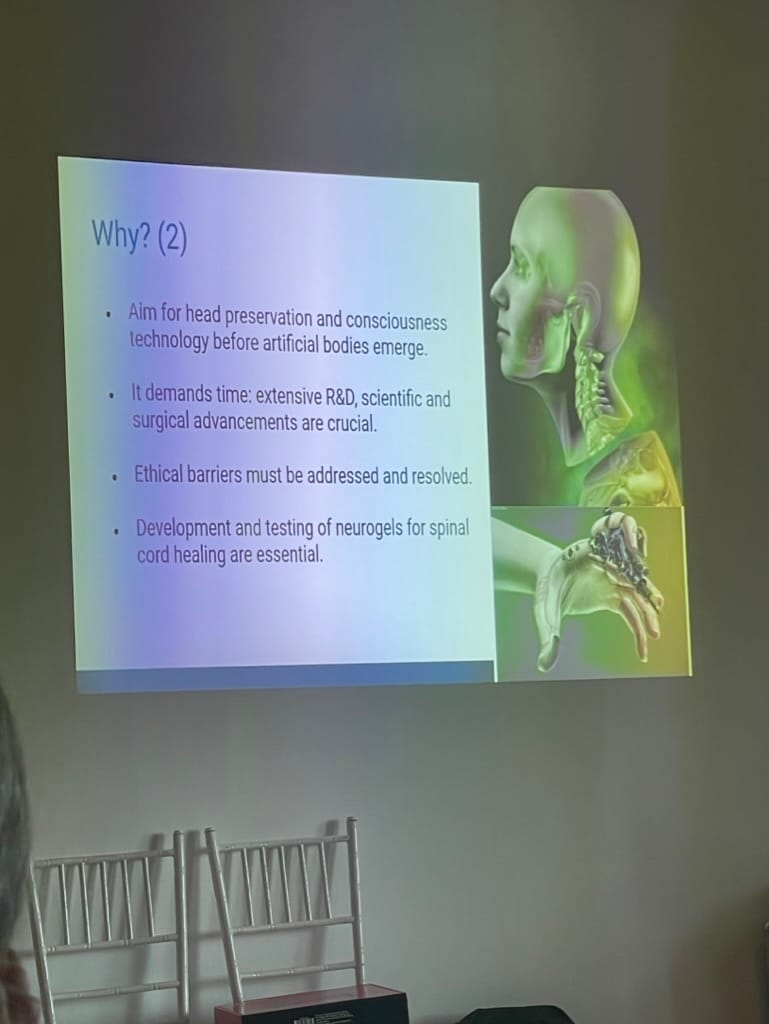
Petr was just one of the many big personalities visiting Roatan who aim to change, extend, or alter life in some way. Another was Scott, who was applying zero-gravity forces to age human cells prematurely, then testing different compounds on them to see how they’d react. Then there was Ben, a world leader in cryonics, who funds organizations to develop non-toxic ways of freezing organs. Yuta, who came through Vitalia only for the weekend Long Bio conference, works on growing stem cells at scale for different therapies. Qing runs a biotech investing firm and was there to meet entrepreneurs. Each one seemed to carry themself with an earned confidence. Not everyone on the island had “made it” yet, but it was hard to doubt they would.
What is Longevity?
Longevity is the quest against aging, the assault on death. To the uninitiated, death-defiance may seem blasphemous—an insult to the natural way of things. But from this side of the Gulf of Honduras it seemed almost reasonable: just the next step in medical advancement. After all, we’ve come so far in treating infectious diseases; why haven’t we succeeded in treating aging-related diseases like cancer, Alzheimer’s, and general frailty and senescence? The consensus opinion of the medical community has been that we just can’t. But thanks to recent advances in gene therapies, CRISPR technology, and deeper understanding of cellular mechanisms, more and more people are breaking with that consensus. Anti-aging research has gone from being an un-fundable pariah to a sizable and quickly expanding field. Its burgeoning status is due in part to the decades of work by famed advocates like Aubrey de Gray, with whom I shared a beer one night. Who knows what his health regimen is like, but I sensed his sharp British humor was at least one thing keeping him spritely at 60.
“So how long do you want to live?” This is one of the questions I liked to ask. Many people told me they wanted to live forever. They did so with no trace of sarcasm, but also with the humility to know that IMMORTALITY! is unlikely to be achieved anytime soon. Most people I spoke with didn’t expect to live for-*ever-*ever. But they’d settle for 200, 250 years. I enjoyed surprising my conversation partners by declaring: “I wanna die.” It was amusing to betray the inverted moral norms of this community. I am serious, though, about death. I would like to experience everything it means to be a human: love, passion, ecstasy, depression, the drama of life and the depths of suffering, and finally to embrace what is animal in me, my return to dust. To me, death is a part of human experience. I did add, however, that I would like to live healthily until I do pass. In the longevity community, living healthily and avoiding death amount to the same thing. If you could live like a 40-year-old at 80, why would you need be any closer to death by 100? When my own question was occasionally turned around on me, I answered, timidly, 120. Long by today’s standards but short by those of this community.
Longevity, I learned through observation, is not one thing. The best way to think about it is that “longevity” is a banner shared by lay enthusiasts and researchers in many fields. It’s the banner that allows the exhaustively self-measured entrepreneur Bryan Johnson to be lumped in with fitness nuts in their early 30s who read Rhonda Patrick’s blog, biohackers testing out nootropic flavonoids, and scientists like Alejandro Ocampo, a Spanish researcher doing the dirty work of testing epigenetic reprogramming techniques on worms and mice. The pursuit of more life, and more vital life, brings these distinct groups together.

“Longevity” is a more palatable concept than “anti-aging” and cryonics, which are commonly portrayed as Faustian quests of the super-wealthy to preserve themselves. Longevity sounds nicer. The word has an association with the elderly that marks it safe for the Methuselan and for the young bucks. Anecdotally, I’ve noticed increasing interest in longevity across many age groups. Many of my Silicon Valley acquaintances are optimizing their health, worrying about xenoestrogen levels, and testing out different supplement blends. But my partner’s mom, an internal medicine doctor in her 60s whose family has a history of dementia, is listening to the same podcasts and reading the same books. Longevity is not just a growing research field, but also a growing culture of health.
I wanted to understand that culture. While in Roatan, I interviewed 15 people—about 10% of the residents of Vitalia during my visit—and spoke to dozens of others, hoping to understand their relationship to longevity. Why is longevity so valuable to them? What do they hope to do, I wanted to know, with all those years? I used an interview technique I’ve been developing with help from Ben Gabbai, adapted from Joe Edelman’s values elicitation framework. My goal was to find out what aspects of longevity, and the longevity community, are sources of meaning for visitors. (When I say “values,” I mean that as shorthand for source of meaning.) Through these interviews, I discovered a few different clusters of values that seem to bond this community together.
The first cluster is what I’ll call the spirit of the challenge. I have already mentioned the high concentration of entrepreneurs at Vitalia. It is a risk-taking bunch of people, and it’s not surprising that they’re attracted to this early and edgy field. The people I spoke with found a deep meaning in the opportunity to face difficult challenges, to test the world, and to test themselves in the process. As one person said, aging is probably the hardest problem that humanity has ever faced—the grand problem of all humanity. To these folks, genetic and cellular mysteries are there to be explored and unraveled. Solving these mysteries can be more than a professional quest, but a personal one, through experimental practices on one’s own body. One person eloquently told me about his desire to test his own limits; here at Vitalia, he had even subjected himself to an experimental gene therapy yet to be approved by the FDA. For these challengers of the seemingly impossible, longevity presents the opportunity to keep growing, learning, and poking at the essence of reality.
Another values cluster was the pursuit of integrity through truth. After years of tolerating crypto’s delusions of grandeur, I was impressed with the commitment to truth that I sensed in Vitalia. Many were free thinkers who held themselves to a high standard of understanding. These people didn’t just take in others’ ideas; they made ideas their own. One person told me about the sense of lightness that comes from speaking truth, even in the face of common wisdom. It is this commitment that attracts her to the longevity community: it is a group of people paying attention to truths ignored by the medical establishment. Another person spoke to me about moral growth, saying that a longer life and more adverse experiences would expand his ability to respect others and bring greater maturity in his outlook.
Finally, there are those enthusiasts whose love of life’s beauty is what makes the value of longevity self-evident. These people may view aging as a disease, or in one person’s memorable words, as “snakes and scorpions” attacking the body. But it is the very taste of life that makes them want to keep living. Life’s most comedic moments, or moments of shared presence and understanding, are the texture that make it worth living. After speaking to Jose Cordeiro for nearly an hour about the dry facts of research findings, he suddenly went into a rapture, describing in detail his experience running the San Francisco marathon. Ah, I understood, moved, here is a man who wants to squeeze the juice from his life, down to the last drop.

Cellular Accounting
Longevity may not be a psychology modality, but like any wellness movement it has certain practices that relate to emotions and behaviors and mental states. For regular adherents of longevity, the main thing one does is tracking. Fitness monitors were common to see at Vitalia. Oura rings, Apple Watches, clunky Garmin trackers, thin Whoop straps, Fitbits, and more adorned the fingers and wrists of Vitalia residents. My arm felt naked.
The essence of tracking is not difficult to understand. The data we collect can tell us more about ourselves than our conscious minds can know. From steps walked to sleep quality, millions of people are already measuring their overall health day to day. Longevity kicks this up a notch. At Vitalia, about two dozen people participated in an experiment with glucose monitoring. Each person purchased a continuous glucose monitor, a device commonly used by diabetics that places a small needle below the surface of the skin to measure blood sugar throughout the day. Participants fired the monitors into their triceps and agreed to adhere to a week of the “bulletproof diet,” a variation of keto, to see how their glucose would respond. When paired with other metrics like sleep and heart rate, it’s a powerful way to learn about how one’s diet and activity affects one’s emotional states.

These are the most casual biomonitoring tools available today, but more are coming. Non-invasive wearable devices for continuous hormonal tracking of menstrual cycles are around the corner. In the future envisioned by anti-aging researchers and enthusiasts, regular or even continuous blood testing may be a normal part of life. As testing gets cheaper, even diet regimens could be subject to better monitoring and personalization. What gets measured gets managed, and the longevity future is a highly measured one.
Bryan Johnson represents the extreme end of cellular accounting. Johnson claims he is the world’s most measured man, tracking everything from the fat content of his liver to lung volume to gray hair. Johnson, who I missed at Vitalia by a week, spends upwards of $2 million each year to understand his health. But for those meticulous enough to track their daily activities, nutrient intake, exercise, and bodily discharges, cheaper options are available. One amateur gave an hourlong report on the “stack” of nutrients he eats to maximize mitochondria production, including parsley, blueberries, and grapefruit juice, citing the latest papers in every slide.

Vitalians I met were using this sort of experimentation not just to have more energy but also to learn about themselves. One woman explained how cutting sugar and salt from her diet allowed her to distinguish her emotional states more clearly from the effects of nutrition. Another morning over a vegan breakfast of fresh papaya and beans, I witnessed one of my favorite interactions of my whole stay. At my table, one of the comprehensive self-tracking enthusiasts negotiated with an indie researcher to design and run a bespoke experiment using his spreadsheet of biometric data. Their final price? $800. A genuine spirit of self-experimentation runs through the community I met at Vitalia.
Such exhaustive self-monitoring protocols sound extreme at first, but they are largely in line with the so-called “4P” paradigm recently proposed by healthcare thought leaders. The Ps stand for predictive, personalized, participatory, and preventative. Prevention through lifestyle interventions and health monitoring is a major part of longevity’s two-pronged attack on diseases of aging (the other prong is aging reversal through still-experimental therapies). But all four of the capital P Principles generally assume the collection of more data, more often, to get a deeper understanding of individuals’ health status and risks. The growing popularity of health trackers seems to be one reason that longevity thinking is also becoming more widespread.
A Death in the City of Life
The values I identified earlier are just a slice of the longevity movement, though, I think, a revealing one. But not only did many members of the Vitalia community work in this nascent field, they all chose to show up to a temporary “pop-up city” in Honduras for two months. For every longevity person I met at Vitalia, I met another who was there for startup cities.
For those of you who have hovered around tech circles for the last few years, this concept will already be familiar. For those who haven’t, here are the basics. The notion of a charter city or startup city is similar to that of a charter school: land, tax benefits, and the right to its own governance and public administration is secured from a larger national government. Special economic zones like Hong Kong, Dubai, and Singapore are examples from the 20th century. Today, others hope to repeat their successes. In recent years, some entrepreneurs and investors, having proven their mettle by building large companies, have been inspired to try their hand at building and operating cities.
The charter city of Prospera on Roatan is one such project. A 58-acre parcel of land purchased from private owners, with its own jurisdiction and real estate development company, Prospera is the actual host of Vitalia. Now if a charter city is the real deal, then a “pop-up city” is more like an on-premise demo. That’s what Vitalia is: a sort of boutique concept city on the longevity theme. (For a comprehensive if slightly dated overview of Prospera, I recommend reading Scott Alexander’s extensive 2021 article on the place. And to read more about the culture of startup cities in general, check out Kaitlin Tiffany’s recent piece.)
I attended one talk explaining the principles behind Prospera. It was like a highly concentrated version of the narrative soup that’s been stewing in tech for the last decade: technological stagnation, the strangulation of economic growth since the 70s, burdensome regulations increasing the cost of new drug development, all leading up to the need for startup cities, new governance models, and innovative regulatory environments. Yet I didn’t manage to meet any stereotypical libertarian ideologues at Vitalia, even among the biggest startup city enthusiasts. Instead, most expressed feelings many of us share: frustration with the failing social institutions at home.

Take Chance McAllister for example. I befriended Chance my first evening on the island. After a few introductory pleasantries, he launched into a fascinating history of 19th-century Mennonite migration. Over our three weeks together at Vitalia, he shared more and more of his interest in new types of social organization with me.
“A lot of what makes life worth living comes from our social ties. I'm from a small town, and of a generation with a robust family institution in place. I see how much my mom leans on her sisters, neighbors, and the larger community for support as she continues life without the love of her life.”
“I've been looking at the history of social orgs or institutions that have the function of generating social ties. Fraternal organizations, for instance, were a serious part of life in countries like USA and Canada, and now they basically don't exist or are a shadow of their former selves. Pop-up cities seem to have similar characteristics that make me cautiously optimistic they could emerge as a wonderful social tie generator.”
I agree with Chance at large: organizations that can generate strong social ties are as essential to our well-being as they are to the well-being of our social fabric. The national conversation around mental health increasingly emphasizes loneliness and social isolation. To address these issues, we need to try all sorts of gatherings, neighborhood association, worship groups, and yes—even cities. At Vitalia, I saw a glimpse of what Chance was talking about. There were a surprising number of young people there, even some undergraduates. The pop-up city model presented an opportunity for them to spend time around older and more successful people—much more so than a conference ever could have. I personally made more new friends and mentors than I have in quite a few years.
The health benefits of social connection is a well-established fact. I don’t believe that’s why longevity enthusiasts and startup city advocates have common ground today. But perhaps it’s the basis that will motivate new sorts of social longevity gatherings and experiments beyond island cities in the near future.
I myself was not staying on Prospera land, but in the neighboring town of Crawfish Rock, one of Roatan’s earliest settlements. My daily walk to and from Vitalia took me along the beach, where I often spotted native white ibis and egrets. One evening before a party, I made my way back to my AirBnB. Approaching the village from the beach, I heard the mournful crooning of some American country singer. As I passed, I saw an arrangement of chairs in the middle of the village, surrounding a classic oak casket.
At the party later that night, I approached an executive at Prospera's development company and mentioned the funeral. He told me he had paid his respects to the deceased earlier that weekend, and we talked about his relationship to Roatan. He introduced me to the mayor of the Prospera jurisdiction, and eventually the conversation turned to the history of this place. It’s a complicated history of contested colonial ownership, annexation and reannexation, and population waves from around the Caribbean. Some Hondurans, including the current Honduran government, are suspicious of Prospera’s presence and fear that it might try to force Hondurans out to acquire more land. So far, this has not come to pass.
Neither has the Honduran government’s efforts to evict Prospera. This seems to be in part because some other residents of Roatan, many of whom live in adjacent Crawfish Rock, are employed by or are otherwise supportive of the project. That said, Prospera doesn’t have much to show for itself yet; all of Prospera that can be seen with the eye is a resort where most of Vitalia events were held, some private residences, a half-built fabrication lab, and a few clinics. The clinics are a hint as to what the eye can’t see: Prospera’s jurisdictional design. Competitive governance is part of Prospera’s strategy to attract business and residents. While it’s rather short on the latter, I was told that 160 businesses have registered in Prospera, and 40 have on-site premises. Some of these are companies offering treatments not yet approved by the more stringent FDA. One such company is Minicircle, to which the self-challenger I met shelled out to get their muscle-enhancing gene therapy.
I spent some time discussing Prospera with my AirBnB host, a native Honduran who grew up on Roatan and who collaborates with Prospera. He viewed Prospera and its operators favorably, and scoffed at richer Roatan residents who he views as cynically agitating against the project. I was compelled by his testimony. Still, I can’t say I liked the slight air of condescension with which the executives, Hondurans though they were, talked about “the locals.”
I reached no firm conclusion about Prospera; history, I sense, will be its best judge. So I mostly withheld my musings from the other Vitalians, who by and large were predisposed to enthusiasm about startup cities. Few Vitalians had the same exposure to the lives of Prospera’s poorer neighbors that I had. That said, when a new employee at the Las Verandas resort got into a motorcycle accident and severed a major artery, several Vitalians volunteered to donate blood multiple days in a row.
The night of the party, I returned late to our rented apartment. I took my time walking through the sandy beach woods. The song of night insects played to my left. To my right, the water sidled gently to the shore. As I entered Crawfish Rock, I heard before I saw: the funeral was in full swing. A local band was playing old rock and folk songs, and at least a dozen people joined their voices to the guitar and scratchy amplifier. Cheerful, joyous, raucous sound—a choir worthy of sending a soul to heaven. All lives, no matter how long or short, are deserving of such a celebration. The longevity movement would do well to find ways to appreciate and rejoice in lives that are lived, not just focus on staving off death. Many people I spoke to had beautiful reasons for living. Those reasons ought to be given space and ceremony, in life and in death.
The music kept me up late that night, the voices dwindling, then rejoining, quieting then surging again, crying out this little light, then I’m gonna go ahead, then hallelujah, the melody and the shouts, until I finally slept, one continuous unchanging song.
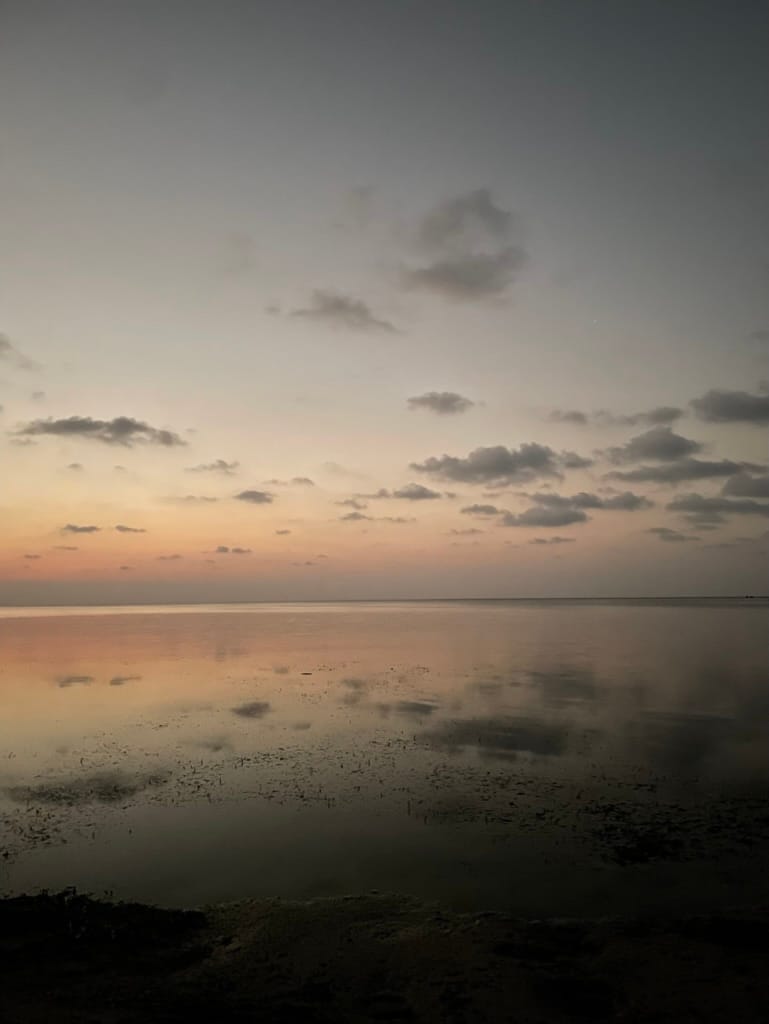
Longevity for Mortals
So you’d like to live forever. Where do you start? Jose Cordeiro described to me the first pillar: do what your mom would tell you. Eat well, sleep well, get exercise. These are the basics, as Peter Attia will tell you in his book. Another thing I picked up at Vitalia is to get to know your body, inside and out. You know your weight, where your pains are. But can you know what you don’t know? Buying a wearable fitness device seems to be one way of moving slightly into the future. I’ll admit that after Vitalia I bought one of those sleep and fitness tracking rings—I’ll report back on that later. There are also more advanced devices, like the continuous glucose monitors. I’m told they don’t even hurt to put in. The spirit of it all is what data can I get? Can I correlate that data to how I feel? Genetic testing is another thing longevity enthusiasts advocate. I’ve always resisted it on the basis of not wanting my data collected, but maybe I’ll give it a shot. Bryan Johnson-level cellular accounting isn’t available to everyone today, but within 10 years some of it could be. Longevity thinking is about information and preparation. It’s about trusting the data. And it’s a commitment to survival. If this is what gets people thinking about their health earlier in life, I don’t see a problem with it.
Longevity as a movement is still nascent. Yet in its critique of the mainstream medical profession, and in its critique of dying, I see a potent moral stance. In ages of ethical incertitude, beacons of virtue that shun defeatism can command great authority. I learned this lesson well during my years in the crypto industry, whose strongest defense was always its critique of the banking sector. I see a similar move being made here. The power of the longevity movement accrues to charismatic individuals like Bryan Johnson, and to the notion of bodily survival in and of itself.
One morning Jose came by my breakfast table with little pamphlets advertising his new book, The Death of Death. He put his hands on my shoulders. “Buy my book,” he said, winking, “and I guarantee you will live forever.” Longevity has this messianic quality, inherited from secularized Christian metaphysics. You’ve only got this one body and this one life, so make of it all that you can. In that sense longevity fits right into our death-denying culture—although it says the quiet part out loud. For these reasons I forecast that longevity thinking will become much more popular in the years to come. Soon we will all have to take a stance on longevity’s critiques of death.
I think the integrity-seeking explorers I spoke to are right—that there is a meaningful moral idea here. Even for those of us who don’t desire to cheat death, the opportunity to live out our life's meanings and not face crippling cancer or dementia is worthwhile. Contrary to those singularitarians who think they’re building artificially intelligent deities, longevity is where I sense the Promethean spark most alive in humanity today. And our Prometheanism is the only thing that guarantees our survival—in myth, if not in fact.
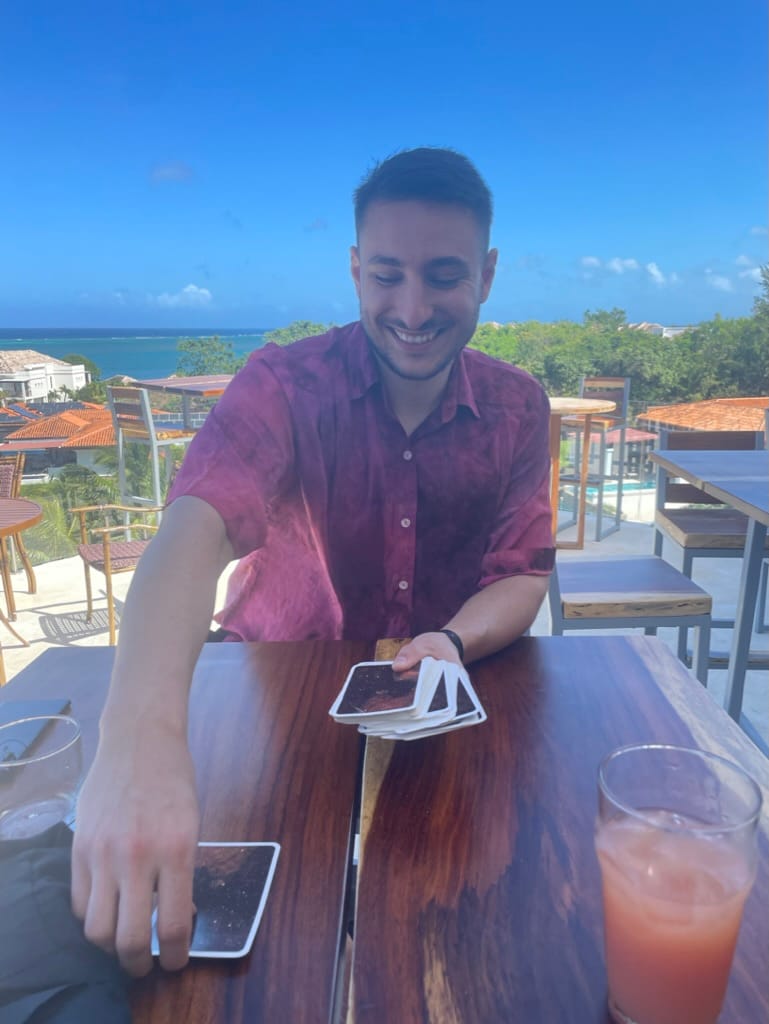
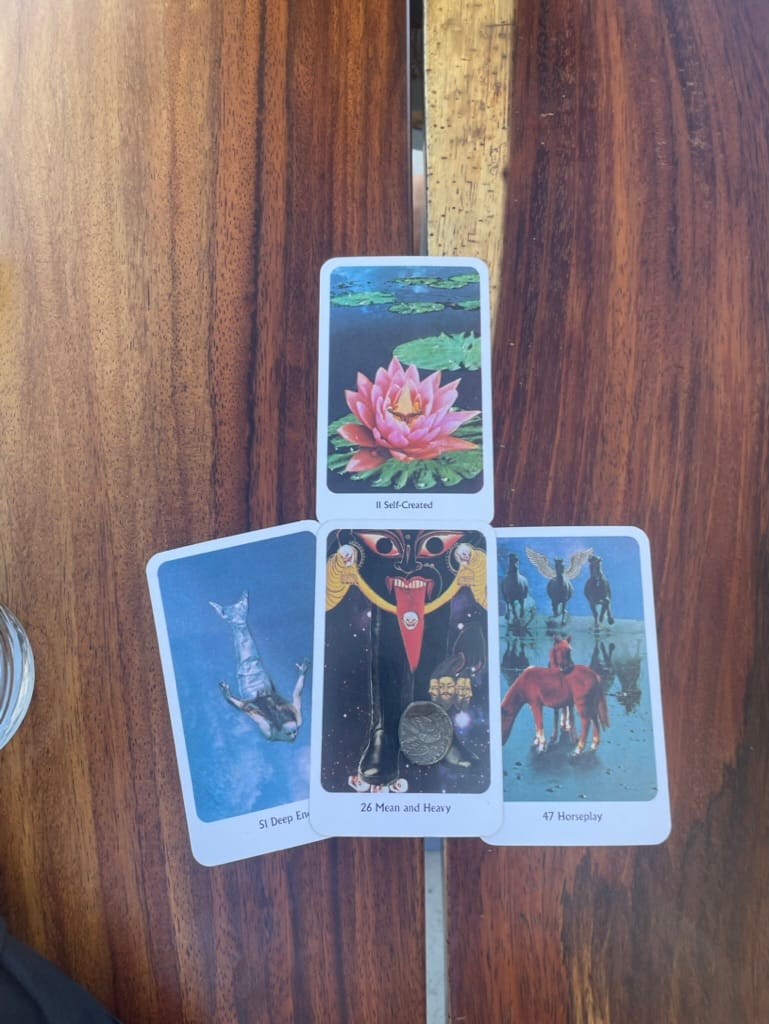
Member discussion